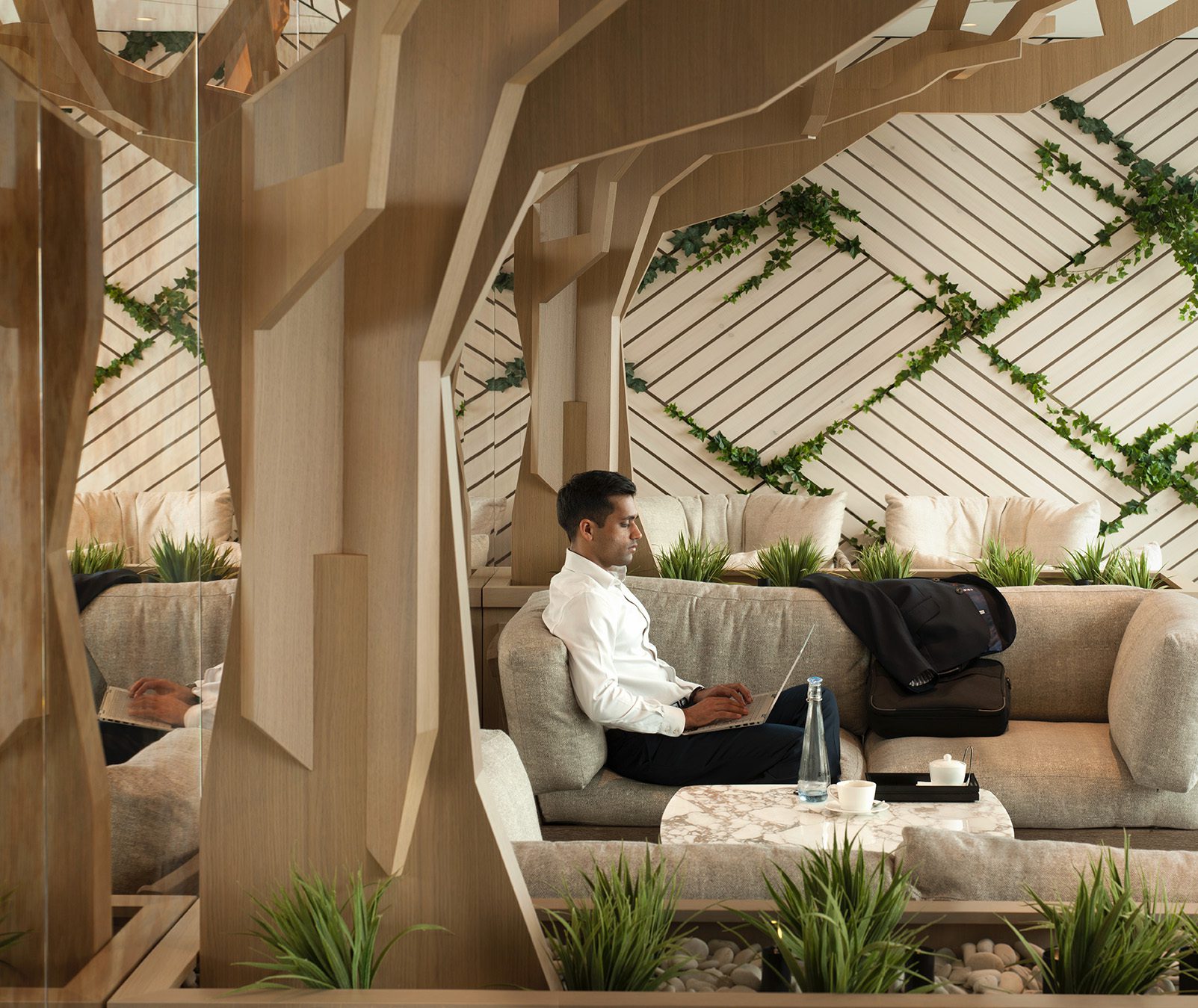Selecting Workplace Furniture for Different Generations
It’s rare that any workplace will exclusively comprise employees from one generation. In fact, diversity among the team across generations often leads to success in business. Gen Z team members lead the way in technological use and creativity, while millennials put in 100% output and growth, and senior generations create much-needed structure.


Written by
Fritha Selwyn Jones
Contents
We always furnish workplaces holistically, and part of that involves understanding the individual needs of employees from different generations. These individuals have grown up and entered the working world in different ways, and so we need to attentively understand and support these approaches in their workplace experiences. What are the considerations of a workplace furniture consultant when approaching intergenerational design? Furniture consultants have the answers.

Understanding Gen Z's Needs
Gen Z was born into a world where technology was already in widespread mainstream use—and they’re the first generation to experience this. The digital natives of Gen Z are completely aligned with technology as a huge part of everyday life to the point where it’s not just a benefit to them to have proper tech integration, it’s a requirement.
This understanding of technology has both positive and negative impacts in the workplace. Thanks to their intuitive understanding of tech, Gen Z is naturally more proactive and efficient in learning and understanding information. However, this also means they tire quickly of repetitive tasks and gravitate towards more creative work.
Gen Z is a much more diverse generation in terms of race, culture, gender, and sexual identity. While there aren't necessarily more accessibility and inclusivity needs than in previous generations, individuals in Gen Z are more forthcoming with demands for their needs to be met, fostering a culture that defends individual requirements and makes space for all.
Gen Z is also known as the ‘loneliest generation’, and this can in large part be attributed to their technological dependence. This loneliness leads to personality traits like shyness, independence, and a sense of disconnectedness, so understanding how these manifest in the workplace is important.
A report by ThoughtExchange found these revealing statistics that paint a picture of Gen Z’s expectations at work.
96% of Gen Z employees prioritise feeling valued, included, and empowered at work.
80% seek jobs that allow them to explore and develop multiple skills rather than focusing on one.
79% want their managers to care equally about their personal and professional development.
53% consider workplace benefits when job hunting, with many willing to take a 19% pay cut if their non-salary needs are met.
39% look for remote work options and 71% of those in remote/hybrid roles wouldn’t return to fully in-person work.
Gen Z has high ESG expectations: 73% would leave due to unethical practices, 68% for unsustainable practices, 62% for social differences, and 58% for political differences.
How do we approach this with workplace furnishing?
1. Tech integrations and flexibility
Ensure tech integration is intuitive, efficient, and seamless. Basic office design with all tech requirements are a minimum standard. However, incorporating smart, tech-enabled furniture like smart desks featuring wireless charging stations, USP ports, and even touchscreens takes this a step further. Height-adjustability and memory presets also allow for easy reconfiguration, which supports individual and collaborative work.
2. Personalisation and inclusivity
Workstations that are easily reconfigurable are just the tip of the custom workplace iceberg. Where Gen Z is concerned, ensuring the space is accommodating to all is vital, and this starts with really getting to know those who will be using it and anticipating the needs of those who will join in the future or visit the space. This means selecting ergonomic furniture that can be adjusted to different bodies, providing gender-neutral bathrooms, ensuring the space is wheelchair accessible, and incorporating quiet zines and sensory-friendly areas.
3. Health and wellbeing
Mental health is high on Gen Z's list of priorities, and the work environment can have a big impact on this, so we’ve got the power to make it a positive experience. There are so many techniques for managing wellbeing in the workplace. A good foundation for this is ensuring the space caters to different ways of working and activities through careful zoning: providing private, secluded space for focus and individual work, breakout spaces for socialising, calm, relaxing areas, and space for collaborative, creative work.
4. Sustainability and ethics
Another priority for Gen Z workers is to ensure their workplace aligns with sustainable principles. As the statistics above shows, 68% of Gen Z workers would leave due to misalignment with unsustainable practices. Putting sustainability at the forefront of your workplace furnishing approach will confirm your intentions and values to your staff, so pairing with the right furniture consultant is key. Look for one with good sustainability credentials. A B Corp-certified company is a good way to go as you know their sustainability practices are third-party validated.
5. Flexible working models
Covid-19 brought with it new ways of working, and Gen Z leaned into this more than any other generation, being the most ‘online’ and a highly creative generation willing to discard older traditions in favour of inventive solutions that work. Hot desking, modular furnishing units, and the use of technology all play key roles in supporting a hybrid team—something many Gen Z candidates look for in new roles.


Catering to the Millennial Workforce
According to research by CBRE, millennials are projected to make up 75% of the workforce by 2025, spanning ages 28–43 in 2024. It’s highly unlikely any workplace won’t have some millennials knocking about, and judging by the statistics, they’ll dominate the team in terms of generation distribution. By catering to millennial needs in the workplace, businesses can optimise operations.
Contrary to popular belief, millennials are not as likely to jump between jobs as you might think, in fact 62% of them would prefer to change jobs as infrequently as possible. When looking for a job to stick with, millennials desire professional development, advancement of their skills, and a challenge. If they feel their skills are being put to good use and they’re receiving the right compensation, they’re happy to stay put. Millennials seek out opportunities to learn new skill sets and favour training and development, something born in part out of living through times of record high unemployment and under-employment coupled with high rates of student debt.
Millennials agree that work life and non-work life need to be separate and take a slightly different stance on technology than Gen Z, feeling it can be intrusive in their personal lives and is only beneficial to a limit. When at work, millennials value the feel and quality of their workspaces to a high degree. Surveyed by CBRE, millennials said they’d be willing to make certain payoffs in favour of more enjoyable workspaces, with 7% even saying they’d be willing to take a pay cut.
When it comes to the nature of the ideal space, many millennials desire privacy and seclusion—ideally a personal office. But it’s likely this is mainly because it’s the best way they can envision this privacy being achieved. Employers can get creative with furniture consultants to create private spaces in larger areas where several people or teams work together.
How do we approach this with workplace furnishing?
1. Flexible and private workspaces
Adaptable workstations and private pods offer a balance of collaboration and personal space, catering to millennials' desire for flexibility and privacy. Furniture can achieve this by using modular partitions, soundproofing, and high-backed furniture without the need for complete office walls to separate spaces.
2. Work-Life Balance and Wellness
Like Gen Z, millennials express that mental health and wellness are crucial for a productive and happy workplace. Incorporate relaxation zones, tech-free areas, and welcoming break spaces to help maintain a clear boundary between work and personal life and support overall well-being.
3. Ergonomic and Comfortable Furniture
Millennials' comfort extends beyond having private space to carry out their work, and furniture consultants seek to understand what this comfort looks like and incorporate it into furniture planning. Providing ergonomic chairs and adjustable desks that promote comfort during long work hours takes care of physical comfort, while carefully thought-out lighting, colour schemes, and decor cater to mental and emotional health.

Spaces for Senior Professionals
The baby boomer generation, which includes those in the 60–78 age bracket, makes up the most senior group of employees in any workplace (in age, not necessarily rank), with Generation X comprising the 44–59 age bracket. These individuals started and most likely carried out the majority of their careers under a very clear managerial hierarchy. Senior professionals value stability, security, and structure at work.
When it comes to communication, baby boomers prefer face-to-face formats, favouring the analogue method of communication over technological or even telephone means. Being able to talk to each other in person easily helps these individuals feel comfortable and efficient in gathering and delivering information.
These generations began their careers in office cubicles, so a certain level of privacy feels natural and needed. However, baby boomers and Generation X have also been found to favour hybrid and remote working models, facts that surprise popular opinion. This could be because many people view senior generations as most likely to be in leadership teams. A 2023 survey by Joblist found that 40% of both Gen X and Boomers favoured remote working while 26% and 23% respectively favoured flexible working—the highest shares in all generations surveyed.
Generation X in particular favours independence and entrepreneurship at work. This is a self-sufficient, resourceful, and individualistic generation, so providing freedom to attain autonomy at work and a sufficient work-life balance is vital.
How do we approach this with workplace furnishing?
Seeking ways to integrate the values of all generations into one cohesive space is important, so recognising factors on which they agree is a great win for furniture consultants—it means satisfying the needs of several different user-types with a cohesive solution. We know that all generations look for spaces that are flexible, offering different types of work environments to choose from as well as ways to make remote and hybrid work easy and efficient. When looking at the needs of senior generations specifically, we’d hone in on the following.
Face-to-face collaboration areas: dedicated meeting spaces with comfortable seating and minimal technology to facilitate in-person discussions, aligning with their preference for face-to-face communication.
Flexible workstations for hybrid models: adaptable furniture that supports both in-office and remote work, such as sit-stand desks and easy-to-use docking stations, catering to the increasing preference for flexible work arrangements.
Structured and organised workspaces: workspaces with clear organisational structures, including personal storage options like filing cabinets and bookshelves, helping maintain a sense of order and stability.
Technology integration with simplicity: workspaces with user-friendly technology that enhances productivity without overwhelming users, ensuring that tech solutions are intuitive and easy to use for all comfort levels.
Traditional and ergonomic furniture: high-quality, ergonomic office chairs and sturdy desks that reflect the traditional setup these generations are accustomed to, ensuring physical comfort for long hours.
Talk to Sketch Studios if you want a workplace that supports each and every member of your team, no matter how old or young.
Published on
August 30, 2024
Related Articles













